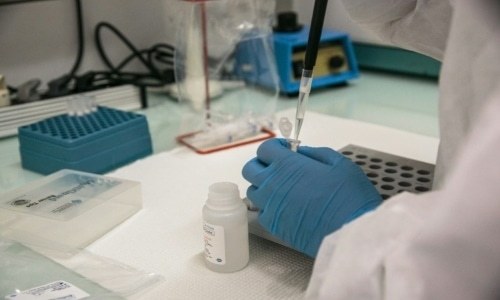South Korea on Monday said that it has found three new cases of “mutated genome sequences” of the coronavirus.
“Genetic mutations were detected to spike protein, the major surface protein of the virus, from the three Covid-19 imported cases — two from Pakistan and one from Uzbekistan,” the Yonhap News Agency reported.
The mutated cases were found after analysis of 776 Covid-19 patients, including 597 local infections and 179 imported cases.
Health authorities said the new mutations found were different from 78,810 viral genome sequences registered by the World Health Organisation’s GISAID database.
GISAID is a global science initiative and primary source for genomic data on influenza viruses and the novel coronavirus responsible for Covid-19.
South Korea's new coronavirus infections fell below 30 on Monday as imported cases slowed, but church-linked infections continued to strain the country's anti-virus fight.
The country’s Korea Centres for Disease Control and Prevention (KCDC) said the 28 new cases over the last 24 hours, including 17 local infections, brought the national caseload to 14,626.
A total of 305 people have died due to the Covid-19 in the country.
It added that imported cases rebounded to double digits on Monday after being reported in single digits for 43 consecutive days.
Health authorities have again shown concern in new infections linked to churches.
“The new cluster infections came as the patients did not wear protective masks properly and did not keep safe distances while dining together," said KCDC Director Jeong Eun-kyeong.
South Korea reported its first coronavirus case on Jan 20, but did not impose a full lockdown. Its policy revolved around enhanced social distancing guidelines.
“We are concerned that there has been an increase in the number of infections at local churches, with the virus also spreading to daycare centers, door-to-door sales businesses, and large-sized marketplaces,” said Yoon Tae-ho, a senior health official.
Authorities lifted a ban on gatherings other than regular worship services at churches on July 24, but said they might revoke the decision to stem the virus’ spread.
South Korea has done 1.6 million tests to date for the virus.
Since first appearing in China last December, the novel coronavirus has spread to at least 188 countries and regions. The US, Brazil, India, and Russia are currently the countries hardest hit in the world.
The pandemic has killed more than 731,300 people worldwide, with over 19.86m confirmed cases, according to figures compiled by the US' Johns Hopkins University. More than 12.11m people have recovered from the disease.














































